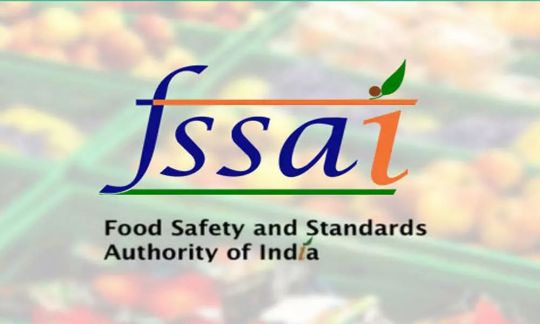Don't wanna be here? Send us removal request.
Text
Fssai License for Health Supplement Products - Food License I Raag Consultants

1) Online FSSAI License – Introduction
Any person who wants to start a business in the food supplement sector, be it food processing or food manufacturing, packaging or distributing, has to register under Food Safety and Standard Authority of India, FSSAI which comes under Ministry of health and get Fssai License or we can say Food License.
FSSAI authority monitors these food supplement operators as per the guidelines and regulations listed in FSSAI Regulation Act, 2006.
With expert advice from Raag Consultants, get an FSSAI license or Food License in the quickest 4 simple steps only-
· Guidance on choosing the right food license.
· Verification of your FSSAI License documents.
· Filing your online FSSAI License application.
· Get the FSSAI food licence as early as possible.
2) What is Food Supplements as per FSSAI Authority?
FSSAI License for Food Supplements means to provide nutrients to provide all the necessary nutrients and non-nutrient chemicals which are biologically beneficial for human body. Supplement includes proteins, vitamins, minerals, amino acids, and many other substances. At present, there are more than 80,000 dietary supplements available in the market. India is rapidly growing market for supplement industry with a massive market size which stood around USD3-4 billion in 2019. With the increase in purchasing power of customers and changing lifestyles, there has been instant increase in the use of health supplements in India for preventing diseases like Diabetes, Blood Pressure, Obesity, Cardio-Vascular diseases and also for maintaining a balanced nutrition and for enhancing their physical appearance, mental sharpness and to become more dynamic and conscious.
Looking at this the FSSAI notified the Food Safety and Standards (Health Supplements, Nutraceuticals, Food for Special Dietary Use, and Food for Special Medical Purpose, Functional Food, and Novel Food) Regulations, 2016 in its Official Gazette on 23 December 2016. All the Food Business Operators will need to comply with FSSAI regulations from 1 January 2018.
Section 22 of the Act deals with genetically modified foods, organic foods, functional foods, proprietary foods, etc. which also includes supplements. It provides for eight categories of foods are covered under these Regulations:
Health Supplements
Nutraceuticals
Foods for Special Dietary Use
Food for Special Medical Purpose
Specialty Food containing plants or botanicals
Foods containing Probiotics
Foods containing Prebiotics
Novel Foods
These supplementary foods are usually manufactured and sold in the form of powders, tablets, capsules and are required to fulfill the quality requirements and standards specified by the Indian Pharmacopoeia, British Pharmacopoeia or the United States Pharmacopoeia. Use of hormones, steroids and other psychotropic ingredients in such supplements are prohibited.
As per the order issued by the FSSAI License Authority dated 16th July 2020, any health supplement and nutraceutical product contains the ingredient name PABA (Para Amino Benzoic Acid) is prohibited and banned from immediate effect. Any food supplement operators or FBOs who are dealing in food supplement which contains the prohibited ingredients should stop trading or selling these products, otherwise Surveillance and enforcement team will take action against them.
The nutrients added to the food articles are not supposed to exceed the Recommended Daily Allowance (RDA) as provided by the Indian Council of Medical Research. As per the Indian Council of Medical Research, the food products falling under the category of health supplement, the individual nutrient content shall not be less than 15% of RDA. But, If the product claims to have higher nutrient content, the nutrient content shall not be less 30% of RDA Also the use of colors (natural, nature identical), synthetic flavors and additives are permitted only after complying the Food Safety and Standards (FSSAI) Regulations, 2011.
Also, the criteria regarding purity for ingredients used in such supplements shall be as determined and notified in the official Gazette by the Food Authority from time to time. The FBO is required to intimate the purity criteria adopted for ingredients to the Food Authority (FSSAI). Any Change in purity criteria shall be made only after giving a prior intimation to the Food Authority.
3) Packaging and labeling of Supplementary Foods
The labels put on such food packing shall be in accordance with the Food Safety and Standards (Packaging and Labelling) Regulations, 2011 and also comply with other specific labeling requirements required for different types of food as provided in the regulations. The labels affixed to package must specify the following information:
· Should have the word ‘HEALTH SUPPLEMENT’ or ‘NUTRACEUTICAL’
· The purpose of the foods and the age group for which they are meant
· The contents used in such supplements
· An advisory warning ‘NOT FOR MEDICINAL USE’
· A statement saying that the health supplement is not be used as a substitute for diet;
· Target consumer group
· The disease or disorders for which they are used
· Warning, precautions and the manner in which they are to be used
· Physiological benefits (only for Nutraceuticals)
· Any other specific labeling requirements
Apart from this, the leaflet or advertisement for such food Supplements must provide sufficient information for their nature and purpose and provide detailed instructions about its use & precautions to be taken while using it, in such a format that is appropriate for the intended consumer.
Before selling such products it is necessary to comply with the Food Safety and Standards (Contaminants, Toxins, and Residues) Regulations, 2011. Every FBO contravening these provisions shall be punished under Chapter IX of the Act.
This article is written by Rahul Grover, Who is a content writer of Raag Consultants
#fssai license online#fssai license#food license#fssai registration#fssai#fssai food license#fssai certification
0 notes
Text
It is Mandatory to Print Fssai Logo and Fssai number on the Product Packing in India

Hi, we are the leading legal expert in India. We have more than 15 years of Experience in Fssai License Consultancy in India.
As per Fssai rules and regulations, it is mandatory for Food business operator to print Fssai logo along with allocated Fssai number on the product packaging. If the food business operator fails to do so then it is an offense and the food business operator may be penalized with heavy penalties. It doesn’t matter whether you have only Basic Registration or State License or Central License.
In case you need any legal assistance or legal advice, you can contact us at +91 8800463370 / +91–11–40043213 or can visit us at our website Raag Consultants.
0 notes
Text
Summary of FSSAI Registration Process 2020 – Raag Consultants - Documents Required, Benefits, Penalty
· What is FSSAI?
· Why is FSSAI Registration Required?
· FSSAI Registration/License Procedure
· FSSAI Registration Requirements
· Procedure For Obtaining FSSAI Registration
· FSSAI License Requirement
· Documents Required For Obtaining the Central License
· Documents Required For Obtaining the State license
· Benefits of Procuring FSSAI Food License
· Consequences of Non-Compliance
· Penalty For Non- Compliance
· Renewal of FSSAI License
1. What is FSSAI?
FSSAI stands for Food Safety and Standards Authority of India which is an organization that monitors and governs the food business in India.It is an autonomous body which is established under the Ministry of Health & Family Welfare, Government of India. The FSSAI has been established under the Food Safety and Standards Act, 2006 (FSS Act) which is a consolidating statute related to food safety and regulation in India. It ensures the food products undergo quality checks thereby curtailing the food adulteration and sale of sub-standard products. It is responsible for the registering and licensing of the Food Business Operators (FBO) in India and it lays down the rules and regulation for running the food business in India.

2. Why is FSSAI Registration Required?
Every food business operator involved in the manufacturing, processing, storage distribution and sale of food products must compulsorily obtain FSSAI Registration or License. FSSAI Registration is different from FSSAI License in the sense that depending on the size and nature of the business, FBO should obtain the necessary registration or license. It is a 14-digit registration or a license number which is printed on all the food packages. The 14 digit registration number gives details about the assembling state, producer’s permit. This registration procedure is aimed to create more accountability on the FBO to maintain the quality of the food products. The licensing and registration procedure and requirements are regulated by Food Safety & Standards (Licensing and Registration of food Business) Regulations, 2011.
3. FSSAI Registration/ Fssai License Procedure
FSSAI registration or license is based on the business volume and premises. Depending upon the installed capacity or turnover or location, applicant premises are eligible for the license such as basic license, central license, and state license.
4. FSSAI Registration Requirements
FSSAI Registration is a basic license and it is required for all the FBO involved in the small-scale food business. This category covers the following businesses:
Any FBO with an annual turnover of not more than Rs. 12 lakh.
Petty retailer dealing in food products
Any person who manufactures or sells any food article by himself
Food sale is done by the temporary stall holder
Any individual who distributes food in any religious or social gathering except a caterer
Small-scale or cottage industries dealing in the food business and the following:
5. Procedure for Obtaining FSSAI Registration
FSSAI registration is initiated by submitting Form A (application) to the Food and Safety Department.
This application can be accepted or it may be rejected by the Department within 7 days from the date of receipt of an application and the rejection has to be intimated to the applicant in writing
If the application is accepted, then the department will grant a registration certificate with the registration number and the photo of the applicant.
FBO should prominently display the certificate of registration at the place of business during the business hours.
The common documents required for Basic, State and Central Registration are a passport photo and a photo ID proof. For State and Central license, the following additional documents will be needed:
Address proof
List of food category
Layout plan
List of equipment
NOC from municipality
Incorporation certificate
List of directors/partners
MOA and AOA
Water test report
Import Export Code

6. FSSAI License Requirement
For all other FBO apart from small-scale business, FSSAI license has to be obtained. FSSAI License can be classified into two categories i.e. State FSSAI License and Central FSSAI License based on the size of the business whether it is a medium scale or large scale business. Generally, FBO who are large manufacturers, importers, exporters dealing in large-scale food business need to obtain FSSAI registration from central government and FBO with small to medium sized manufacturing units, transporters, marketers, traders, etc., need to take FSSAI registration from the state government. To apply for State License the FBO must have a turnover between Rs 12 lakh to Rs 20 crore. Other conditions include manufacturing units having capacity of 2MT per day, dairy units handling business up to 50000 liters per day. 3 star hotels and above, repackers, relabelling units, clubs, canterns all catering business irrespective of their turnover need to apply for the license. The tenure of the license being maximum of 5 years and minimum of 1 year. To apply for a central license the FBO must have a turnover exceeding Rs. 20 crores and needs to have operations in two or more states. All importers and exporters need to apply for this license. The maximum tenure is 5 years and minimum is 1 year.
7. Documents Required For Obtaining the Central FSSAI License:
Form B duly completed and signed
Plan of the processing unit showing the dimensions and operation-wise area allocation
List of Directors/ Partners/ Proprietor with address, contact details, and photo ID
Name and list of equipment and machinery used with the number and installed capacity
List of food category to be manufactured
Authority letter from manufacturer nominated a responsible person name and address
Analysis report of water to be used in the process to confirm the portability
Source of raw material for milk, meat etc
Recall plan wherever applicable
Ministry of Commerce Certificate for 100% EOU
NOC/PA document issued by FSSAI
IE code document issued by DGFT
Form IX
Certificate from Ministry of Tourism
Proof of possession of premises
Partnership deed/ affidavit of proprietorship
NOC and copy of License from the manufacturer
Food safety management system plan or certificate
NOC from the municipality or local body
Supporting document for proof of turnover and transportation
Declaration form
8. Documents required For Obtaining the State FSSAI License:
Form B duly completed and signed
Plan of the processing unit showing the dimensions and operation-wise area allocation
List of Directors/ Partners/ Proprietor with address, contact details, and photo ID
Name and list of equipment and machinery used with the number and installed capacity
List of food category to be manufactured
Authority letter from manufacturer nominated a responsible person name and address
Analysis report of water to be used in the process to confirm the portability
Proof of possession of premises
Partnership deed/ affidavit of proprietorship
NOC and copy of License from the manufacturer
Copy of certificate obtained under Coop Act 1861/Multi state Coop Act 2002
Food safety management system plan or certificate
There are different forms and documents which are required to be submitted conversion, renewal, and modification of license.
9. Benefits of Procuring FSSAI Food License
Obtaining a license can provide the food business with legal benefits, build goodwill, ensure food safety, create consumer awareness, and assist in business expansion. Also it helps regulate, manufacture, storage, distribution and sale of import food.
10. Consequences of Non-Compliance
Any registered or licensed person under the FSSAI has to adhere to the rules and regulation under the FSS Act, 2006. Food safety officer generally conducts the inspection of the food business operator’s facility and identifies the level of compliance with the regulation using a checklist. Based on the compliance level, the food safety officer marks it as:
Compliance (C)
Non-compliance (NC)
Partial compliance (PC)
Not applicable/Not observed (NA)
Based on the above, the food safety officer might issue an improvement notice where ever required per Sec 32 of the FSS Act, 2006. If the business operator fails to comply with the improvement notice, the officer after giving the licensee an opportunity to show cause may cancel his license. Any food business operator aggrieved by an improvement notice can appeal to the State Commissioner of Food Safety. The decision thereon can be challenged through appealing to the Food safety appellate tribunal/high court.
11. Renewal of FSSAI License
The FSSAI license is essential to commence the food business, similarly it is imperative to renew the license. The license is issued for a validity of 1 year or 5 years, so the business must apply for renewal 30 days prior to the expiry of current license. FSSAI has introduced an online application called Food Licensing and Registration System (FLRS) so businesses can apply online for the licences. The FLRS is utilized in five Regional Offices for the issue of licenses and entitlements. They are:
Northern Region -New Delhi
Eastern Region – Kolkata
North Eastern Region – Guwahati
Western Region – Mumbai and Kerala
Southern Region – Chennai
This article is written by Aakash Singhal who is a content writer of Raag Consultants
2 notes
·
View notes